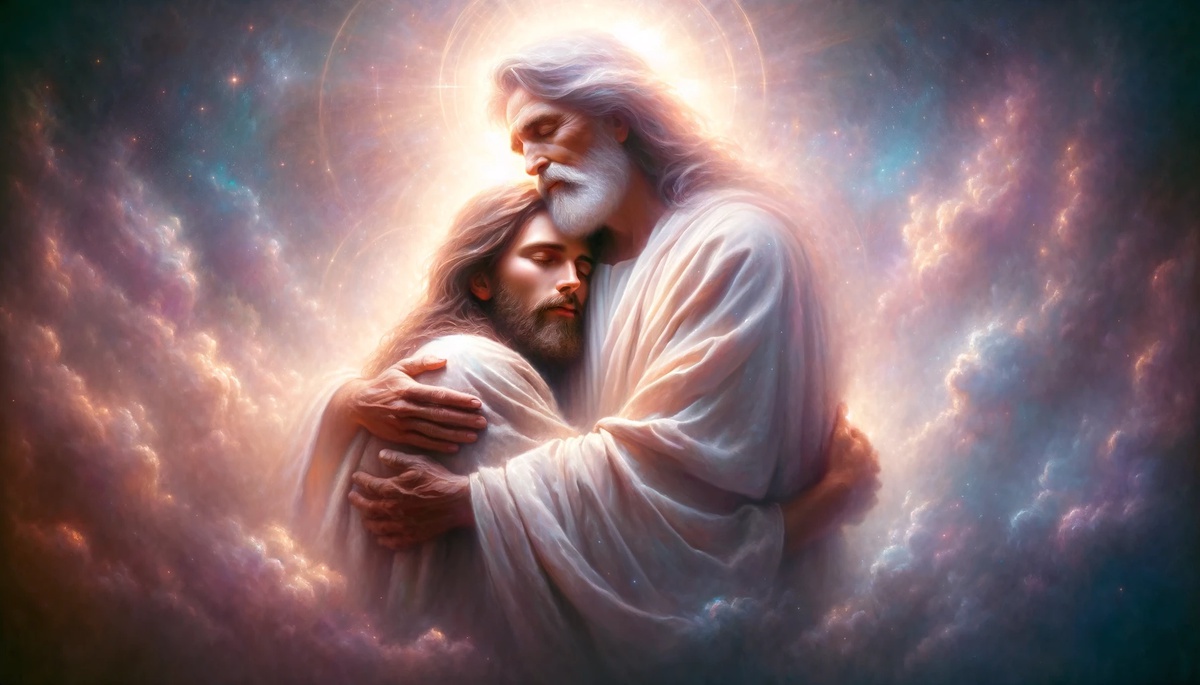Home>Christian Videos>Bible Stories>Why Jesus Christ Was Born


Bible Stories
Why Jesus Christ Was Born
Published: March 1, 2024
Ericka Andersen, an editor at Christian.net, expertly merges digital strategy with content creation, focusing on faith and societal issues. Her communication skills enhance the platform's engaging narratives, fostering meaningful dialogue on belief's impact on society.
Explore the significance of Jesus Christ's birth in the Bible stories. Discover the reasons behind his miraculous arrival and the impact of his life and teachings.
(Many of the links in this article redirect to a specific reviewed product. Your purchase of these products through affiliate links helps to generate commission for Christian.net, at no extra cost. Learn more)
Table of Contents
The Purpose of Jesus Christ's Birth
The purpose of Jesus Christ's birth can be traced back to the fulfillment of a divine plan to bring salvation to humanity. According to Christian belief, Jesus was born to redeem mankind from sin and reconcile them with God. His birth marked the beginning of a new covenant between God and humanity, offering the promise of eternal life to those who believe in him. The purpose of Jesus Christ's birth goes beyond a mere historical event; it represents the embodiment of God's love and mercy for all of humanity.
-
Redemption of Mankind: Jesus Christ's birth was intended to serve as the ultimate sacrifice for the sins of humanity. In Christian theology, his crucifixion and resurrection are seen as the means through which individuals can attain forgiveness and salvation. His birth, therefore, set in motion the events that would lead to the ultimate redemption of mankind.
-
Revelation of God's Love: Through his birth, Jesus Christ revealed the depth of God's love for humanity. The act of God taking on human form demonstrated a profound connection between the divine and the mortal, emphasizing the importance of compassion, empathy, and understanding in the human experience.
-
Establishment of a New Covenant: Jesus Christ's birth signified the establishment of a new covenant between God and humanity. This covenant, as described in Christian scriptures, offered the promise of eternal life to those who accepted Jesus as their savior, emphasizing the transformative power of faith and grace.
-
Demonstration of Humility and Servanthood: The purpose of Jesus Christ's birth also encompassed the demonstration of humility and servanthood. His willingness to be born in humble circumstances and live a life of service to others served as a model for selflessness and compassion, inspiring countless individuals to follow his example.
-
Fulfillment of Prophecies: For believers, Jesus Christ's birth fulfilled numerous prophecies from the Old Testament, reinforcing his divine purpose and validating his role as the long-awaited Messiah. This fulfillment of prophecies served to strengthen the faith of those who recognized the significance of these ancient predictions.
In essence, the purpose of Jesus Christ's birth transcends the boundaries of time and culture, offering a message of hope, redemption, and divine love to all who seek it. His life and teachings continue to inspire and guide millions of people around the world, shaping the course of history and leaving an indelible mark on the human experience.
Read more: What Continent Was Jesus Christ Born In
The Significance of Jesus Christ's Incarnation
The significance of Jesus Christ's incarnation lies in the profound impact it has had on the understanding of God's relationship with humanity. The concept of the incarnation, which refers to the belief that Jesus, as the Son of God, took on human form, holds immense theological and spiritual significance for Christians around the world. This event represents the convergence of the divine and the mortal, bridging the gap between God and humanity in a way that had never been experienced before. The incarnation of Jesus Christ carries several key implications that continue to shape Christian belief and practice:
-
Revelation of God's Nature: The incarnation of Jesus Christ serves as a revelation of God's nature and character. By taking on human form, Jesus provided a tangible representation of the divine, allowing individuals to witness and experience God's love, compassion, and grace in a relatable and accessible manner.
-
Identification with Human Experience: Through the incarnation, Jesus Christ identified with the full range of human experiences, including joy, suffering, temptation, and triumph. This identification underscores the empathy and understanding that God has for the struggles and challenges faced by humanity, fostering a sense of connection and solidarity between God and His creation.
-
Redemption and Atonement: The significance of Jesus Christ's incarnation is intricately linked to the redemptive and atoning work that he accomplished through his life, death, and resurrection. His incarnation paved the way for the ultimate sacrifice on the cross, providing a means for humanity to be reconciled with God and offering the promise of salvation to all who believe in him.
-
Model of Holiness and Righteousness: As the incarnate Son of God, Jesus Christ exemplified a life of holiness, righteousness, and obedience to the will of God. His earthly ministry and teachings serve as a model for believers, guiding them in the pursuit of spiritual growth, moral integrity, and devotion to God.
-
Affirmation of the Human Body and Creation: The incarnation affirms the value and sanctity of the human body and the created world. By taking on a physical form, Jesus dignified the human body and affirmed the goodness of God's creation, emphasizing the importance of caring for both the physical and spiritual aspects of life.
In summary, the significance of Jesus Christ's incarnation extends far beyond a mere historical event; it represents a fundamental aspect of Christian faith and theology. The incarnation serves as a cornerstone of belief, shaping the understanding of God's presence in the world and His enduring love for humanity. It stands as a testament to the profound depths of God's engagement with His creation, offering a message of hope, reconciliation, and divine purpose to all who embrace the truth of the incarnation.
The Impact of Jesus Christ's Life on Humanity
The impact of Jesus Christ's life on humanity reverberates through the annals of history, shaping the course of civilizations and leaving an indelible mark on the collective consciousness of humankind. His teachings, actions, and ultimate sacrifice have had a transformative effect on individuals, societies, and cultures, transcending geographical boundaries and enduring across millennia. The profound impact of Jesus Christ's life on humanity can be observed through several key dimensions:
-
Ethical and Moral Framework: Jesus Christ's life and teachings laid the foundation for a profound ethical and moral framework that continues to influence human conduct and societal values. His emphasis on love, compassion, forgiveness, and justice has permeated diverse cultures and civilizations, inspiring countless individuals to embody these virtues in their interactions with others.
-
Social Justice and Equality: Jesus Christ's advocacy for the marginalized, oppressed, and disenfranchised has catalyzed movements for social justice and equality throughout history. His example of standing in solidarity with the marginalized and challenging systemic injustices has fueled the efforts of individuals and organizations dedicated to addressing societal inequities.
-
Spiritual and Personal Transformation: The life of Jesus Christ has been a catalyst for spiritual and personal transformation, offering individuals a path to redemption, forgiveness, and inner renewal. His message of salvation and the promise of eternal life has provided solace and hope to countless individuals facing adversity, despair, and existential questions.
-
Cultural and Artistic Expression: The life of Jesus Christ has inspired a rich tapestry of cultural and artistic expression, encompassing literature, music, visual arts, and performing arts. His life story, parables, and teachings have served as a wellspring of creativity, inspiring masterpieces that reflect the depth of human imagination and the enduring impact of his narrative.
-
Global Influence and Legacy: The impact of Jesus Christ's life extends across the globe, transcending linguistic, cultural, and religious barriers. His teachings have been disseminated to virtually every corner of the world, shaping diverse religious traditions, philosophical movements, and ethical paradigms, leaving an enduring legacy that continues to resonate with individuals from diverse backgrounds.
-
Humanitarianism and Service: The example of Jesus Christ's life of service, compassion, and selflessness has been a catalyst for humanitarian efforts and charitable initiatives aimed at alleviating suffering and addressing societal needs. His emphasis on caring for the vulnerable and extending kindness to others has inspired countless individuals to engage in acts of benevolence and philanthropy.
In essence, the impact of Jesus Christ's life on humanity transcends the confines of a singular historical figure; it represents a profound testament to the enduring power of love, compassion, and the pursuit of justice. His life continues to serve as a source of inspiration, guidance, and transformation for individuals seeking meaning, purpose, and a deeper connection with the divine.
The Mission of Jesus Christ on Earth
The mission of Jesus Christ on Earth encompassed a multifaceted and transformative purpose that reverberates through the annals of history. His earthly ministry, teachings, and actions were imbued with a profound sense of divine purpose, culminating in a mission that transcended the boundaries of time and space. The mission of Jesus Christ on Earth can be delineated through several key facets, each of which underscores the depth and breadth of his transformative impact on humanity:
-
Proclamation of the Kingdom of God: Jesus Christ's mission centered on the proclamation of the Kingdom of God, heralding a message of divine sovereignty, redemption, and the establishment of a new order characterized by righteousness, peace, and the fulfillment of God's purposes. His teachings and parables conveyed the imminent arrival of God's reign and the invitation for individuals to partake in this unfolding reality.
-
Revelation of God's Love and Mercy: Central to Jesus Christ's mission was the revelation of God's boundless love and mercy for humanity. Through his interactions with the marginalized, the outcast, and the downtrodden, he exemplified the compassionate nature of God, extending grace and healing to those in need and demonstrating the transformative power of divine love.
-
Redemption and Atonement: The mission of Jesus Christ encompassed the redemptive and atoning work that culminated in his sacrificial death on the cross. His mission was to provide a pathway for humanity to be reconciled with God, offering the promise of forgiveness, salvation, and the restoration of broken relationships. His ultimate sacrifice served as the linchpin of God's plan for the redemption of mankind.
-
Demonstration of Holiness and Righteousness: Jesus Christ's mission included the demonstration of a life characterized by holiness, righteousness, and obedience to the will of God. His ethical teachings and moral example served as a model for individuals, guiding them in the pursuit of spiritual integrity, moral uprightness, and a deepening relationship with God.
-
Confrontation of Injustice and Oppression: Throughout his mission, Jesus Christ confronted systemic injustices, religious hypocrisy, and the exploitation of the vulnerable. His actions and teachings challenged the status quo, calling for a radical transformation of societal structures and a commitment to justice, equity, and compassion.
-
Empowerment of Disciples and Followers: An integral aspect of Jesus Christ's mission was the empowerment of his disciples and followers to continue his work in the world. He imparted teachings, commissioned them to proclaim the good news, and equipped them with the spiritual resources necessary to carry forth the message of God's kingdom and the transformative power of faith.
In essence, the mission of Jesus Christ on Earth encapsulated a divine mandate to usher in a new era of spiritual renewal, reconciliation, and the establishment of God's reign in the hearts of humanity. His mission continues to resonate with individuals across the globe, inspiring a legacy of faith, compassion, and the pursuit of justice that endures to this day.
The Fulfillment of Prophecies through Jesus Christ's Birth
The fulfillment of prophecies through Jesus Christ's birth stands as a testament to the divine orchestration of history and the fulfillment of ancient promises. Throughout the Old Testament, numerous prophecies foretold the coming of a Messiah, a savior who would bring redemption, restoration, and the establishment of God's kingdom. The birth of Jesus Christ serves as the fulfillment of these prophetic utterances, validating his identity as the long-awaited fulfillment of God's redemptive plan. The fulfillment of prophecies through Jesus Christ's birth is a cornerstone of Christian faith, underscoring the continuity of God's purpose across the span of human history and the unfolding of His salvific design.
-
Virgin Birth: The prophecy of the virgin birth, as foretold in Isaiah 7:14, found its fulfillment in the miraculous conception of Jesus Christ by the Virgin Mary. This extraordinary event underscored the divine nature of Jesus' birth and affirmed his unique role as the Son of God, fulfilling the ancient prophecy with profound significance.
-
Messiah from the Lineage of David: The lineage of Jesus Christ traced back to the house of David, fulfilling the prophecy that the Messiah would be a descendant of King David. This fulfillment, as prophesied in the Old Testament, affirmed Jesus' royal lineage and his rightful claim to the Messianic title, establishing a direct link to the promises made to David regarding an everlasting kingdom.
-
Birth in Bethlehem: The prophecy of the Messiah's birth in Bethlehem, as articulated in Micah 5:2, found its fulfillment in the humble town where Jesus was born. This fulfillment underscored the meticulous alignment of historical events with divine prophecies, validating Jesus' identity as the long-awaited fulfillment of Messianic promises.
-
Out of Egypt: The prophecy that the Messiah would come out of Egypt, as prophesied in Hosea 11:1, found its fulfillment in the flight of Joseph, Mary, and the infant Jesus to Egypt to escape King Herod's decree. This fulfillment highlighted the intricate interplay of historical events and divine providence, affirming the continuity of God's redemptive plan.
-
Savior of All Nations: The prophecy that the Messiah would be a light to the Gentiles and bring salvation to the ends of the earth, as foretold in Isaiah 49:6, found its fulfillment in the universal scope of Jesus Christ's redemptive mission. This fulfillment emphasized the inclusive nature of God's salvific plan, transcending cultural and ethnic boundaries to embrace all of humanity.
The fulfillment of prophecies through Jesus Christ's birth serves as a foundational pillar of Christian belief, affirming the divine authority of Scripture and the continuity of God's redemptive narrative. These prophetic fulfillments validate Jesus' identity as the promised Messiah, underscoring the coherence of God's plan throughout the ages and the enduring relevance of His redemptive work. The fulfillment of these prophecies through Jesus Christ's birth resonates as a profound testament to the faithfulness of God and the realization of His promises in the person of Jesus, the long-awaited Savior of the world.















